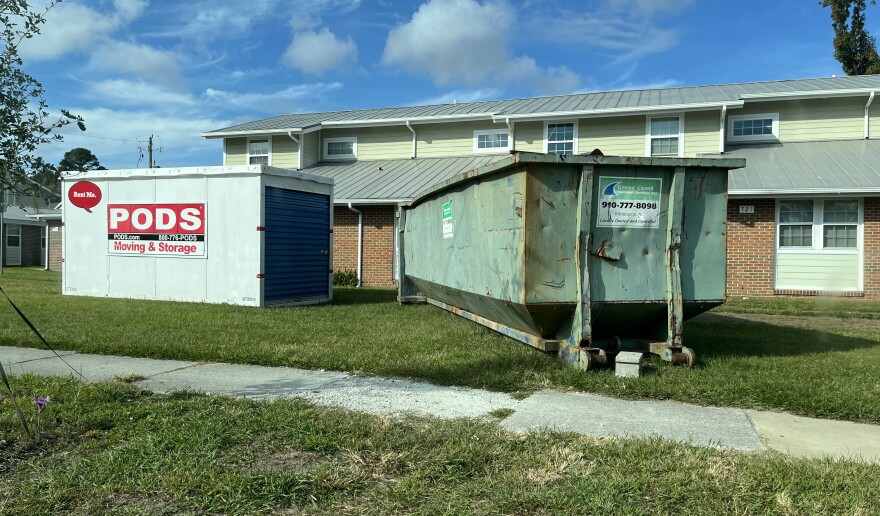The Wilmington Housing Authority is still struggling to manage displaced families whose homes are inundated with mold. Late last year, WHA delivered a status report to the City of Wilmington, forecasting that the process of getting over 100 families back into their homes would probably take a year and cost over $8 million dollars.
WHA faces two main shortages — funding and contractors. The Authority can handle mold inspections and 'remediation' (i.e. removing the mold) but it is falling behind on 'reconstruction,' that is, getting units back in shape for families to return home.
WHQR’s Kelly Kenoyer and Ben Schachtman have the latest on this story.
- This conversation also appears on the latest edition of The Newsroom, which airs Friday, Feb. 11 at noon and Sunday, Feb. 13 at 1 p.m. You can also find it here.
- Find more on the WHA mold crisis here
Kelly Kenoyer: Hey Ben.
Ben Schachtman: Hey Kelly.
K: So you’ve been continuing our accountability reporting on the Wilmington Housing Authority [WHA]. What’s the news this week?
B: Well Kelly, I went to the most recent WHA meeting – and then sat down with Board Chair Al Sharp the next day. The WHA is basically still in the same position, fighting two main issues: first, they can’t seem to get enough contractors to help get units that have had the mold removed back on line – basically, re-construction to put them back together. And second, they’re running out of money to house the tenants who are displaced. We don’t have exact numbers – WHA declined to discuss that until they present at City Council, which is expected to be on March 1, although that’s not set in stone. Not knowing those numbers is frustrating as journalist, but we can say there are still roughly 100 families displaced, maybe more. And bottom line, the situation isn’t sustainable.
K: I mean, even the cheapest hotels are at least $80 a night, and hotel rooms have actually ballooned in costs recently — that’s not going to improve as we move into tourist season.
B: Right, and WHA confirmed that hotel managers are sometimes hesitate to rent to large numbers of WHA tenants — there’s the same problem with commercial apartments, which WHA told me is where they’d way rather put displaced families. To me, it seems blatantly discriminatory – since WHA’s money is as good as anyone else’s and they’re paying market rates — but since [apartments and hotels] are businesses, WHA can’t force them. It’s leaving WHA in a bind for where to put them next.
K: So what’s the plan?
B: WHA is asking the city and county, as well as those in the development community, to basically lean hard on hotels and apartment management companies. But even if that works, they need money – they’ve applied for nearly $13 million in emergency HUD funding, but even that might not be enough.
This is already a crisis – but we’re reaching a tipping point to something even worse. No public official has been willing to say this on the record, but we could be look at trailer parks or some kind of tent city. I don’t mean to sound drastic, but we’re headed for a cliff.
K: That’s just… unimaginably awful. What’s the city doing about this?
B: Hopefully we’ll see a discussion of this in March when WHA presents to council – right now, there’s been some discussion of renting places from Cape Fear Collective, but there just aren’t enough. In the meantime, WHA have discussed using housing vouchers. Basically, WHA is restructuring the rating system to allow displaced families to get ahead on the waiting list — even if they’re already on that last. WHA is expected to announce that soon, and we’ll have coverage of it when they do, but vouchers may not fix the problem, either.
K: Why’s that?
B: Well, the housing market is bustling, and that means vouchers just aren’t that competitive. We’ve had rents go up 23% in the past five years, and a ton of that rise has been in the last year. As [WHA Board Chair] Al Sharp told me — when the market is in a slump, vouchers work great. When it’s booming, not so much.
K: Yeah, my landlord threatened to raise the rent by $400 when my lease is up, so I know it’s super competitive. How do the vouchers work now that they can’t compete as well?
B: Well, when a lot of people are trying to rent the same apartment, a landlord might be more inclined to go with a renter who requires less paperwork. HUD has specific guidelines for what housing is acceptable, and during downturns and times of low demand, getting any renter might make those hoops worth jumping through. But when the market is this competitive, it’s a disadvantage.
K: Aren’t they also quite limited?
B: Yeah. The way it works is that those vouchers are basically a subsidy, but the family still has to pay the difference. That means each significant rent increase is largely left to the family, and they just have to try to scrape together that extra $200. That wouldn’t be happening if they lived in the usual public housing.
K: What a tough situation, and it’s hard to see a clear way out of it. There’s so many ways this tragedy interplays with the affordable housing shortage- and there are definitely policies that might help.
B: Like what?
K: We’re running out of time, so you’ll have to listen to the newest episode of The Newsroom to find out!
B: Haha, will do! Thanks Kelly.
K: Thanks Ben.



